As the world's leading manufacturer of precision optics, ZEISS have combined technical expertise and innovative ideas into exceptional visual experiences.
Zeiss Lenses
ZEISS maintain that sight is the most important of the five senses: the complex interaction between the brain and our eyes helps us see the world around us and all its details throughout our lives.
That’s why excellent vision is essential when it comes to ensuring a high quality of life. Glasses play a major role in helping us achieve this aim.
At Pretavoir, we're proud to partner with ZEISS Vision Care, together we are here to assist you in finding that perfect glasses and lens combination whether you're short-sighted or long-sighted.
To meet the challenges of everyday life, we need hard, dirt-resistant lenses that are easy to clean. This is precisely what ZEISS lenses offer with their hard, anti-reflective lens coating.
What makes ZEISS lenses with DuraVision® Platinum AR coating different?
These hard and light lenses are very robust, dirt-resistant and easy to clean while offering first-rate anti-reflective properties. An integrated system of coating layers densely packed using ion-assisted deposition results in a lens surface that is three times harder than the previous generation of hard anti-reflective (AR) coated plastic ZEISS lenses and 35 % harder than AR coated glass ZEISS lenses*. ZEISS lenses with DuraVision® Platinum AR coating also have a more cosmetically attractive, blue residual reflection colour that generates over 20% less luminous reflectance than conventional green AR coated ZEISS lenses.
1. More robust
Made up of nine ultra-thin layers, an integrated system of coating layers densely packed using ion-assisted deposition results in a lens surface that is three times harder than the previous generation of hard (AR) coated plastic ZEISS lenses.
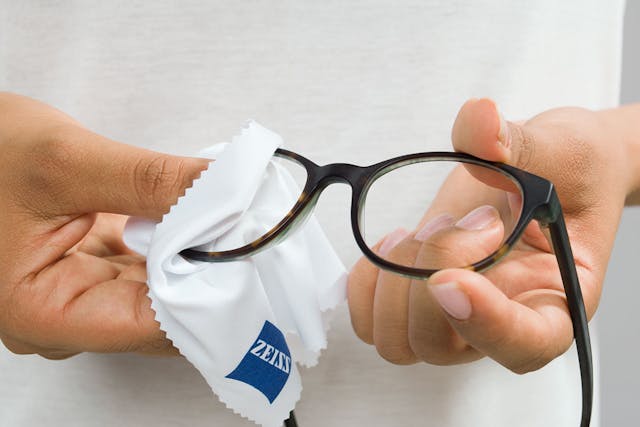
Images on right show first show lenses without DuraVision Platinum, then lenses with ZIESS DuraVision Platinum.
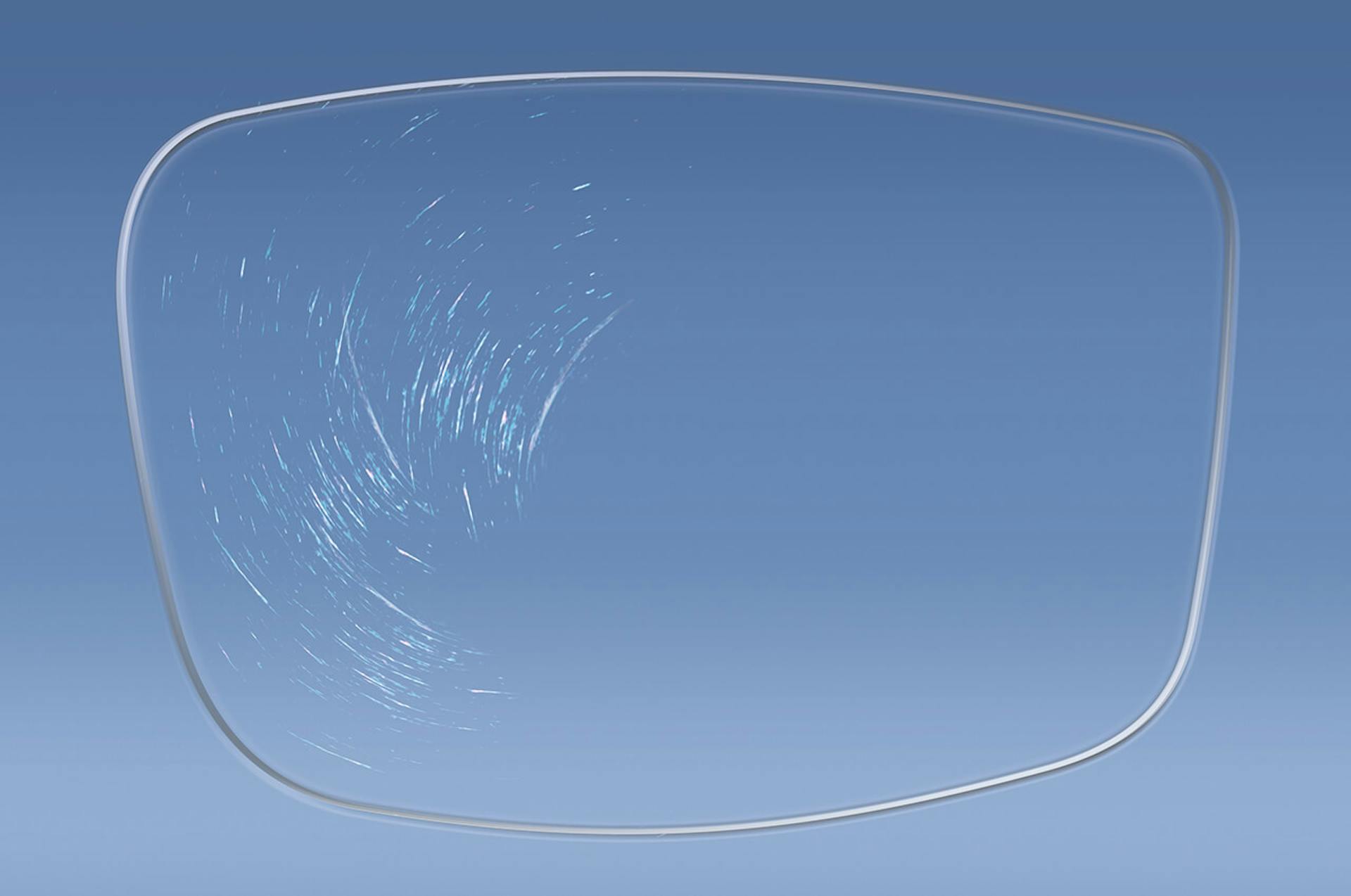
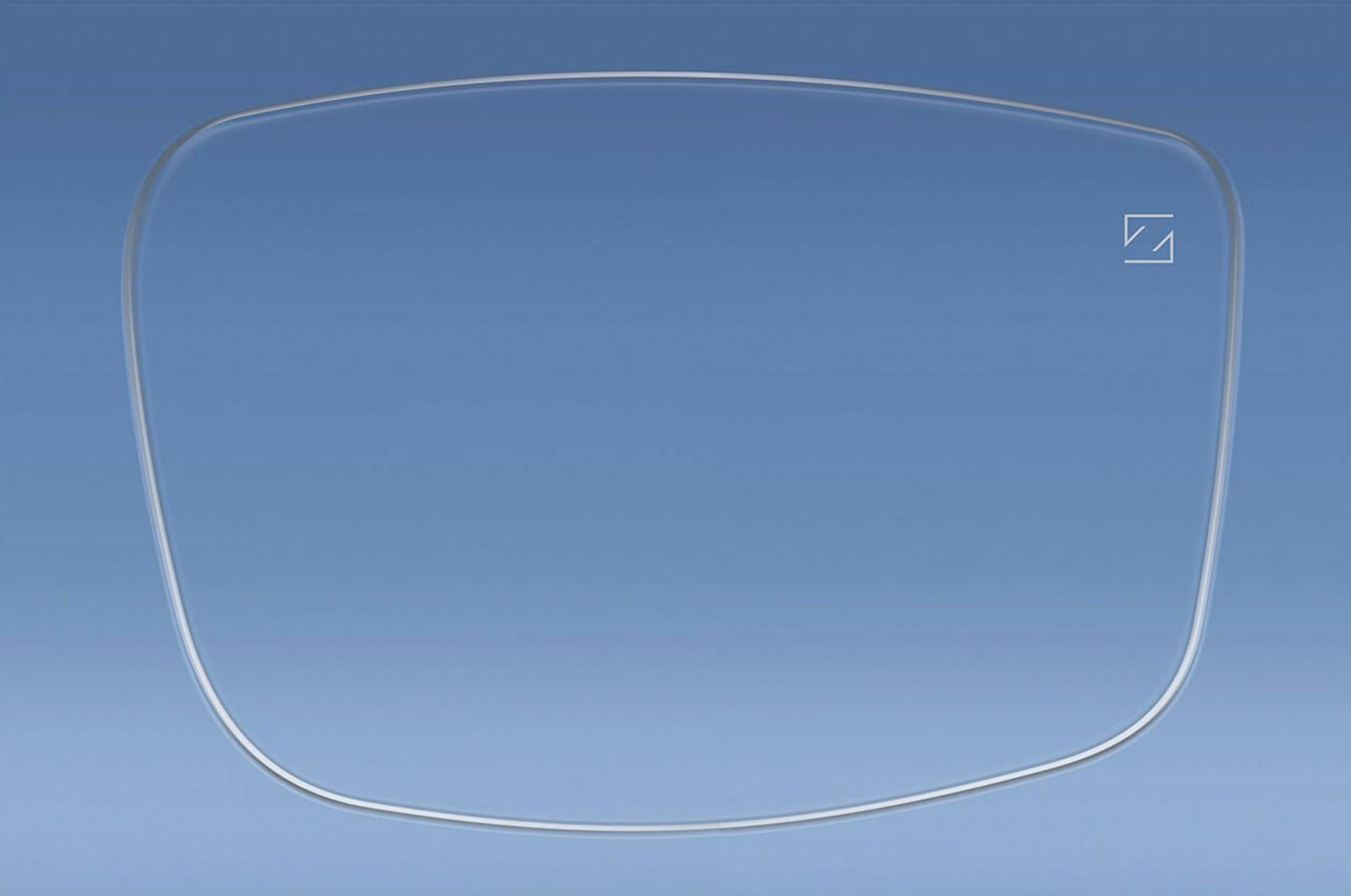
1. More robust
Images on right show first show lenses without DuraVision Platinum, then lenses with ZEISS DuraVision Platinum.

2. Dirt-resistant
ZEISS' patented anti-static layers prevent the build-up of static electricity which stops dust and lint attracting to the lens surface.
Therefore your lenses stay cleaner longer.
Images on right top show lenses without DuraVision Platinum then below the lenses with DuraVision Platinum.

2. Dirt-resistant
ZEISS' patented anti-static layers prevent the build-up of static electricity which stops dust and lint attracting to the lens surface.
Therefore your lenses stay cleaner longer.

Images on right top show lenses without DuraVision Platinum then below the lenses with DuraVision Platinum.
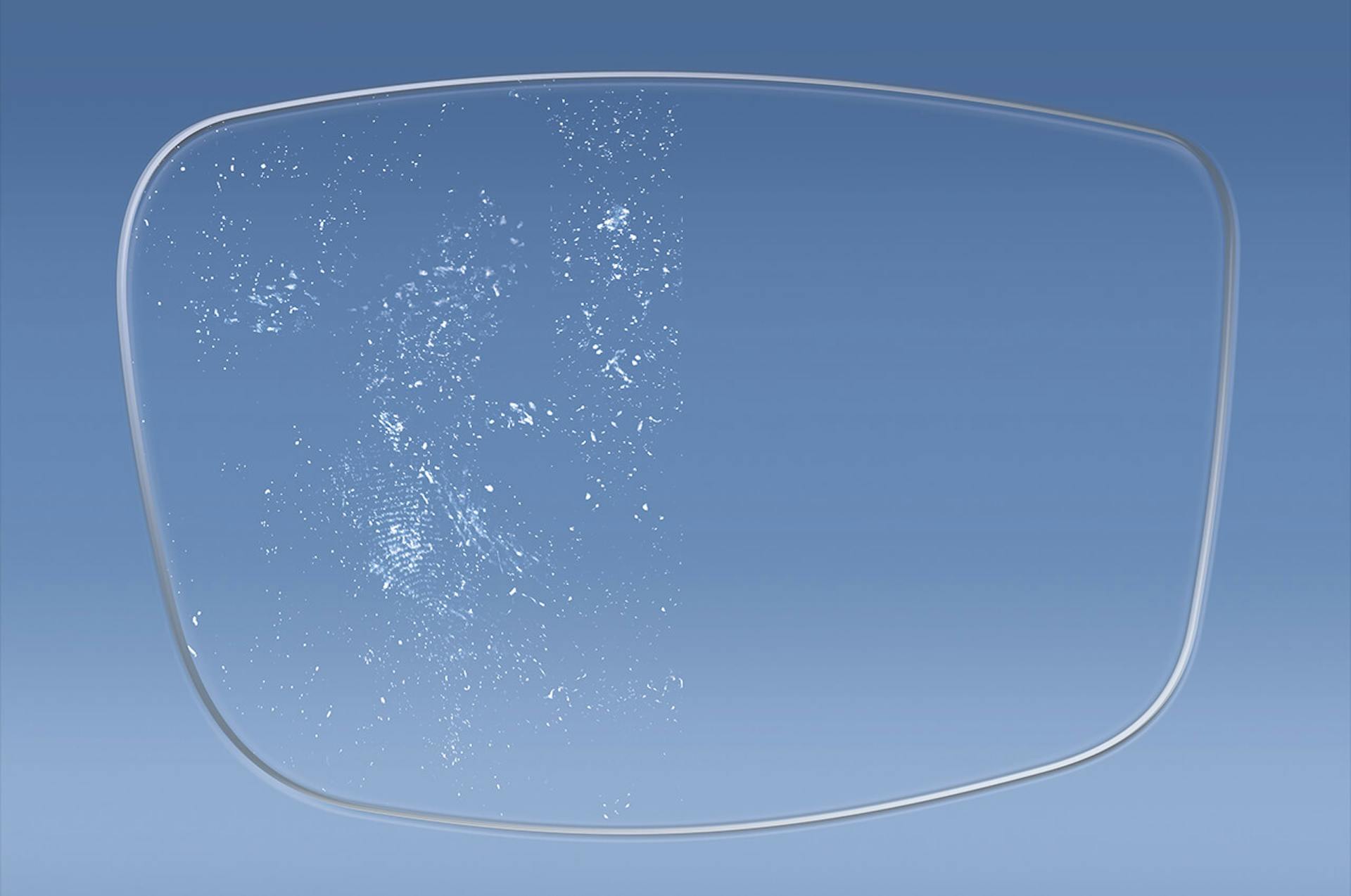

3. Very easy to clean
The super-slick Clean Coat makes lenses very easy to clean. Lenses with high contact angles repel oil and water more effectively.
ZEISS lenses with DuraVision® Platinum AR coating have a contact angle of a minimum of 110° (lenses without super-slick clean coat: 95°).

Images on right show top image without DuraVision Platinum lenses then below with DuraVision Platinum
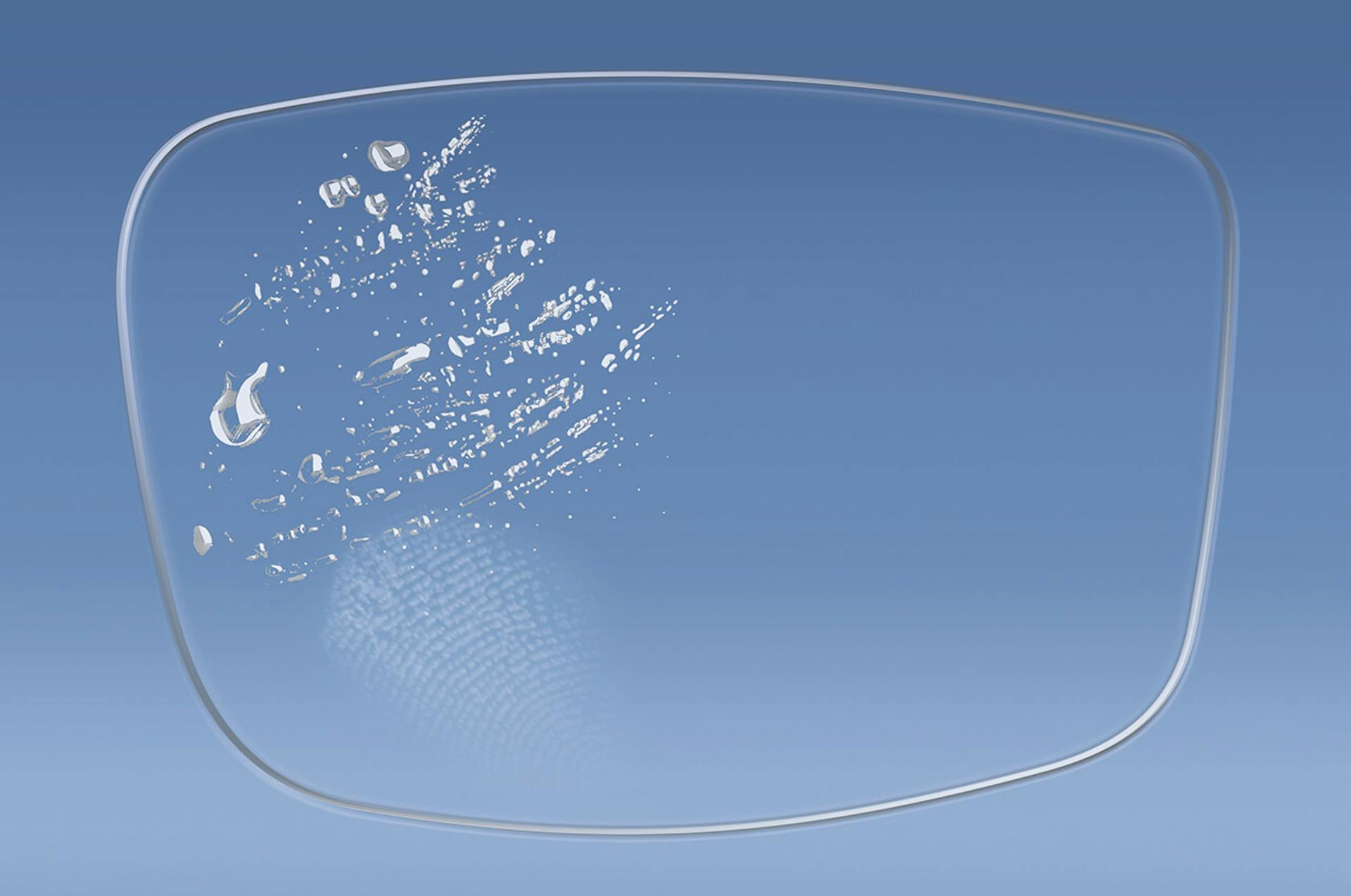

3. Very easy to clean
The super-slick Clean Coat makes lenses very easy to clean. Lenses with high contact angles repel oil and water more effectively.
ZEISS lenses with DuraVision® Platinum AR coating have a contact angle of a minimum of 110° (lenses without super-slick clean coat: 95°).


4. Anti-reflective properties
A less noticeable and blue reflection colour increases the light transmitted by the lens, resulting in even better vision.
These lenses show more than 20% less luminous reflectance than conventional green AR coated ZEISS lenses.
4. Anti-reflective properties
A less noticeable and blue reflection colour increases the light transmitted by the lens, resulting in even better vision.
These lenses show more than 20% less luminous reflectance than conventional green AR coated ZEISS lenses.

Images on right show lenses without DuraVision Platinum then lenses with DuraVision Platinum.
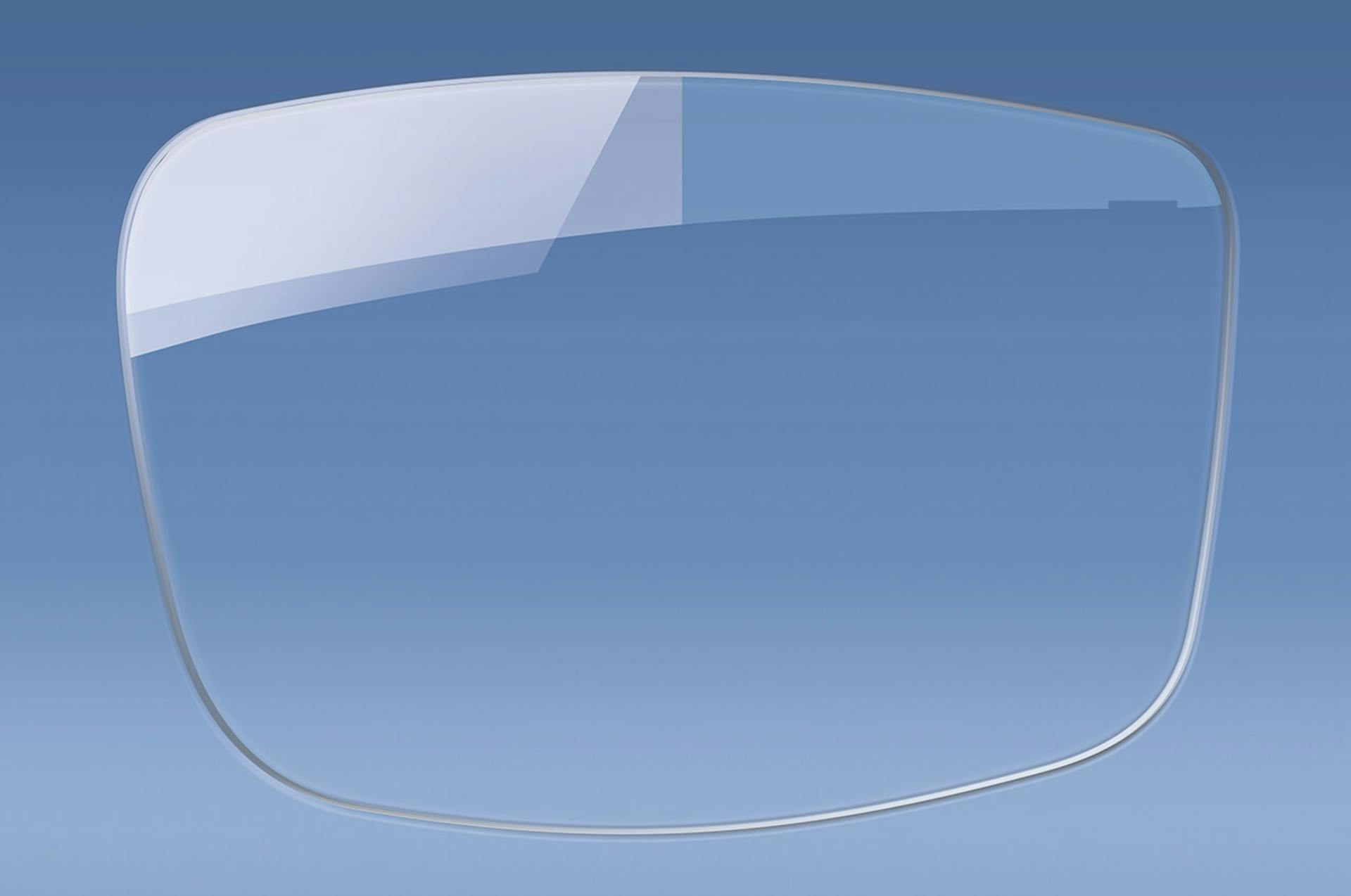

Discover the technology behind the hardest ever ZEISS lenses with DuraVision® Platinum AR coating
Why compromise on hardness, dirt-resistance and easy cleaning when you can have new ZEISS lenses with DuraVision® Platinum AR coating?.
Made up of nine ultra-thin layers, an integrated system of coating layers densely packed using ion-assisted deposition results in a lens surface that is three times harder than the previous generation of hard (AR) coated plastic ZEISS lenses.
The secret of hard lenses? Ion bombardment.
Ions transfer their kinetic energy to the coating molecules when these strike the lens surface. This results in the coating on the lenses being applied in more densely packed layers.
Why compromise on hardness, dirt-resistance and easy cleaning when you can have new ZEISS lenses with DuraVision® Platinum AR coating?
Made up of nine ultra-thin layers, an integrated system of coating layers densely packed using ion-assisted deposition results in a lens surface that is three times harder than the previous generation of hard (AR) coated plastic ZEISS lenses.
The secret of hard lenses? Ion bombardment.
Ions transfer their kinetic energy to the coating molecules when these strike the lens surface. This results in the coating on the lenses being applied in more densely packed layers.
The hardest lenses ZEISS ever made.
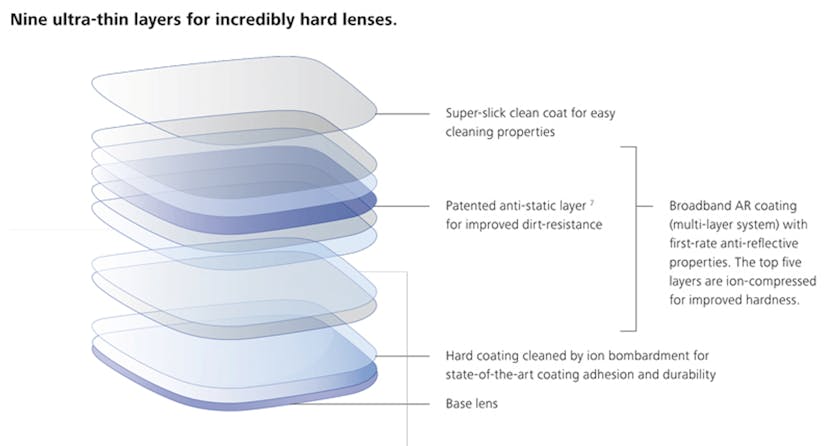
The hardest lenses ZEISS ever made.
Three questions - three answers:
1. What exactly is a “hard” lens?
Lenses need to be robust enough to resist damage in daily life. The harder the lens surface, the more robust the lenses are.
2. How is lens hardness defined?
To find the best ways to make the hardest ever ZEISS AR coating for DuraVision® Platinum, we looked at:
- Other high-tech industries
- The everyday life of a spectacle wearer
3. How does DuraVision® Platinum perform in terms of hardness?
DuraVision® Platinum outperforms previous generations of ZEISS AR coatings in:
- High-tech hardness testing
- Real-life simulation tests
- The Bayer ratio
Following the measurement setup as described in DIN ISO 14577, ZEISS use an indentation instrument to determine two critical properties of DuraVision® Platinum.
First, they measure the hardness in a depth range of around 200 nanometers, the most critical range for visible scratches. To create scratches that extend to more than the critical 200 nm below the coating surface, much higher forces need to be applied for DuraVision Platinum than for conventional greenish ZEISS AR coatings.
At the same time, their team also measured the force needed to completely break the coating. The force needed to generate coating breakage is increased from 211 µN (conventional ZEISS coatings) to 316 µN.

ZEISS undertake hardness tests using DIN ISO 14577
Following the measurement setup as described in DIN ISO 14577, ZEISS use an indentation instrument to determine two critical properties of DuraVision® Platinum.
First, they measure the hardness in a depth range of around 200 nanometers, the most critical range for visible scratches. To create scratches that extend to more than the critical 200 nm below the coating surface, much higher forces need to be applied for DuraVision Platinum than for conventional greenish ZEISS AR coatings.
At the same time, their team also measured the force needed to completely break the coating. The force needed to generate coating breakage is increased from 211 µN (conventional ZEISS coatings) to 316 µN.


SDWT (Standardized Dirt Wiping Test): The test that reflects real life: 600 wipes with 4kg pressure and ZEISS DuraVision Platinum lenses still look like new.


High-tech equipment in the development of DuraVision® Platinum
The technology: a high-resolution nano-indenter
ZEISS improved the surface hardness and crack-resistance of the coating. They achieved this by using a new technology that has been used internationally in many different industries in which the hardness of material surfaces plays an important role, e.g. in the development and production of modern precision tools. But so far, it has not been applicable to lenses.
At the forefront of research, ZEISS sourced specialist indentation equipment that is precise enough for the extremely thin coating layers on spectacle lenses. This equipment has just recently been developed and was immediately integrated into the ZEISS research lab to help create the hardest ever ZEISS AR coating – DuraVision® Platinum.
SDWT (Standardized Dirt Wiping Test): The test that reflects real life: 600 wipes with 4kg pressure and ZEISS DuraVision Platinum lenses still look like new.
In daily life, most scratches occur when lenses are cleaned with a cloth that has dirt on it, either from abrasive dirt particles that are on the lens when the wiping starts or from dirt particles that are already in the cloth. In the SDWT we use an artificially soiled cloth to simulate damage caused by lens cleaning:
- Cleaning procedure using standardized dust to soil cleaning cloth
- Improvement in scratch resistance from previous generations of ZEISS AR coating to DuraVision® Platinum after 600 wipes with 4 kg pressure.
High-tech equipment in the development of DuraVision® Platinum
The technology: a high-resolution nano-indenter
ZEISS improved the surface hardness and crack-resistance of the coating. They achieved this by using a new technology that has been used internationally in many different industries in which the hardness of material surfaces plays an important role, e.g. in the development and production of modern precision tools. But so far, it has not been applicable to lenses.
At the forefront of research, ZEISS sourced specialist indentation equipment that is precise enough for the extremely thin coating layers on spectacle lenses. This equipment has just recently been developed and was immediately integrated into the ZEISS research lab to help create the hardest ever ZEISS AR coating – DuraVision® Platinum.
In daily life, most scratches occur when lenses are cleaned with a cloth that has dirt on it, either from abrasive dirt particles that are on the lens when the wiping starts or from dirt particles that are already in the cloth. In the SDWT we use an artificially soiled cloth to simulate damage caused by lens cleaning:
- Cleaning procedure using standardized dust to soil cleaning cloth
- Improvement in scratch resistance from previous generations of ZEISS AR coating to DuraVision® Platinum after 600 wipes with 4 kg pressure.










